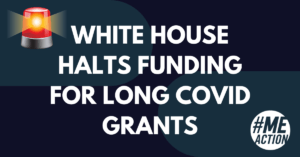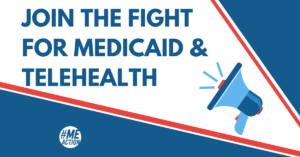After 14 years of harmful recommendations, the National Institute for Health and Care Excellence (NICE) was due to publish the new guideline that banned graded exercise therapy on 18th August 2021. Instead, at the 11th hour, they “paused” publication. Exactly two months after the planned publication date, on 18th October, they held a roundtable, bringing together the Royal Colleges, NHS England, professional associations and the patient organisations fighting for an end to the harm.
#MEAction UK volunteer, Janet Sylvester, attended the roundtable on behalf of #MEAction UK.
She tells us:
“I felt this was a positive meeting. There were large areas of agreement from all attendees, including all acknowledging the terrible experiences people with ME have had to endure. Together, the representatives from ME patient organisations were able to strongly get across the reality for people living with ME. I’m optimistic the guidelines will be published.”
NICE told the 31 attendees that the proceedings could be reported under Chatham House Rules, meaning that Janet can report on the discussions but not identify individuals’ views.
Full Report from Janet Sylvester
NICE’s objectives for the meeting were to set out their approach for the ME/CFS guideline and discuss and understand the concern that have been raised regarding the guideline. My feeling at the end of the meeting was that these objectives had been achieved, thanks to excellent chairing by Dame Carol Black. One attendee privately commented, “The treatment of ME has been Dickensian.”
Methodology
Paul Chrisp, NICE’s Director of the Centre for Guidelines, opened the first session by describing the process of guideline development, emphasising that the process for developing the ME/CFS guideline followed exactly the same process as all other guidelines and was underpinned by a review of the best available evidence.
The guideline development committee chair, Peter Barry, who had been working on the guideline since late 2017, then summarised the guideline, explained the rationale behind the key recommendations and described the methodological approach.
The core topic areas were introduced in turn by Peter Barry, who described what the guideline said on each topic and then opened up the topic for discussion.
The discussion was robust, but broad areas of agreement were apparent on all the topics as the meeting progressed. Key areas of concern were expressed only by a very small number of the attendees and are described below.
Diagnosis
There was concern raised that evidence from adults was being extrapolated inappropriately and applied to children and young people. In response to this, it was made clear that there were many members on the guideline committee with significant experience of paediatrics who had supported the recommendations for children and young people.
Other experts in the room strongly defended the recommendations made, and the necessary extrapolation of certain evidence from adults due to the dearth of research in children and young people.
It was agreed that post-exertional malaise was a necessary criterion for diagnosis.
Safeguarding
The concern here centred around the recommendations in the ME/CFS guideline contradicting those in the NICE guideline on child maltreatment. Specifically the recommendations around suspecting fabricated or induced illness where there is decreased school attendance and/or parents/carers are accessing multiple clinical opinions.
Other attendees laid out the harm being caused by current safeguarding procedures, with hundreds of parents/carers being wrongly accused of mistreating their children. It was made clear that the recommendations were there to ensure safeguarding procedures were not misused.
Graded Exercise Therapy
GET was, not surprisingly, the topic that was discussed in the most detail.
Several attendees reported that they were not aware of any instances of GET being offered in the form described in the new guideline (fixed incremental increases in activity). This was contradicted by clinicians and other health professionals who cited their experience of seeing people with ME who had been severely harmed by GET.
Further evidence was provided by a representative who had carried out a survey demonstrating that GET, as described in the guideline, was still being offered in some clinics.
It was accepted that GET, as defined in the guideline, is causing harm. This definition is based upon wording from PACE and GETSET.
The argument that the term GET should remain in the guideline because some people are helped when it’s provided differently was swiftly demolished. It was agreed that it wasn’t appropriate or sensible to call other therapeutic approaches GET if they didn’t follow the GET protocol.
Rehabilitation was also discussed, but there was general consensus that patients in this group are different from those in general care and that standard rehabilitation methods do not apply. It was felt that people with ME require a period of extensive evaluation and stabilisation before any sort of activity programme is even considered.
Cognitive Behavioural Therapy
The guideline’s statement that CBT is not curative for ME was seen as an issue by a small number of attendees, who suggested patients and clinicians would be put off considering the therapy. Other attendees defended the need to specify that CBT was not curative to ensure commissioning of services was appropriate.
One attendee opined that there was nothing in the guideline about the length of time it takes to get better from ME, stating that there’s no hope for people with ME in this guideline. This received a very strong response that all the patient feedback emphasised how important honesty was, and greatly appreciated the truthful statements in this guideline. Another attendee responded that we should never be holding out false hope for patients.
Moving Forward
Two issues were raised at the end of the meeting that the room felt needed to be addressed if the guideline was to be effectively implemented. One was around the commissioning of services and the other around training of those delivering the new guideline. The key to moving forwards was felt to lie in these areas.
There was general agreement that meeting again to discuss these issues would be positive, and there appeared to be a commitment from training providers to develop appropriate materials to reflect the guideline’s recommendations.
NICE said they would address commissioning issues with NHS England, and would like to work with patient organisations to get positive stories of good clinical practice into training.
NICE also suggested that they would prepare a statement of support for the new guideline for attendees to sign.
Next Steps
The NICE Guideline Executive is meeting today (Tuesday 19 October) and we expect to hear more from them shortly.
We would like to extend our gratitude to all those who attended to fight for publication of this guideline. Together, the ME community put across a strong and unified position.
With cautious optimism,
The #MEAction UK Team






17 thoughts on ““The treatment of ME has been Dickensian” – NICE’s roundtable on the ME/CFS guideline”
Thank you for the update. It is important that ME Action do NOT sign a statement of support provided by NICE since issues remain with the new guidelines – ME Action can release their own statement with their own wording – but should NOT be pushed into dropping any and all criticism by NICE. Do NOT sign any such statement but retain your independence and ability to criticize aspects in future.
I absolutely agree. Write your own statement, but be cautious about signing one penned by another organisation without being sure of any and ALL implications. The psych lobby are not done yet.
Really agree with this comment.
This “guideline” is many years late, wholly inadequate on many topics, vague, missing blood identifiers, treatment of pain with correct (yes, opioid in some cases at appropriate levels–not some crap psych meds that cost a fortune and do nothing for pain and do alter you in a negative way), don’t collect research information correctly, still coddle the psych cabal (why are they even involved???!!!), etc… This guideline should not exist. The last one should not exist. They should have been renounced. We need correct funding, medical research leading to medical treatment and in the meanwhile, we need medical support treatment of symptoms to help with pain, sleep, wakefulness, nutrition, etc… to lead the best possible lives. Massage therapy, appropriate physical therapy for range of motion and strength training within capability is helpful. Call out medical malpractice and abuse. Just GET ON WITH IT. Stop all of this tolerance of obnoxious, egotistical frauds. Really stop now.
This is a really uplifting summary.
It validates and vindicates all we have been saying and campaigning for in East Anglia. Thank you! http://nandsme.blogspot.com/p/the-story-so-far.html Hanging in the balance – ME & CFS Service Development
Please could you inform me of the inclusion (if any) of Welsh patients, I follow all the revelvant updates regarding the NICE guidelines but nothing is ever mentioned about people living with condition in Wales, I personally feel more forgotten than others with this hellish diagnosis
Is it possible to say, left to right, who is in the photo pls.
Encouraging but keeping everything crossed still.
Thanks for asking Von. Been unwell since 1993, still no idea who all of those people are, so would be nice if not polite to know who they all are.
Thanks for feeding back your view of how the meeting went, and thanks for MEAction for all their work.
Feel we are in safe hands, but not out of the woods. Once those guidelines are published and the next steps are in place i.e training has been implemented and patients are free from harm, then we can relax.
We can make use of Invest In MER conferences and centre of excellence for much of this for ongoing training then no excuse to be kept in the dark re research.
Thanks, Jane. Hope it can be filled in at some stage.
Standards for commissioning services should be high . Detailed records of patients condition before, during after and several months after any treatment. And when is conserving exertion (rest) so our immune system can get on with its job going to become recognised as actual ‘treatment’? http://www.positivehealth.com/article/cfs-me-long-covid/medically-unexplained-symptoms-diverting-5-year-funding-from-mental-health
“There was general agreement that meeting again…”
So the result of the secret illegitimate “roundtable” meeting is that there will be…
MORE MEETINGS
PACE was never retracted, the awful Cochrane exercise review was never replaced, the NIH intramural study is permanently “suspended”, the CDC multi-site study has never published results, and now the replacement of the 2007 ME guideline has turned into a permanent can-kicking exercise.
Will people ever break their rose-colored glasses? Sure seems unlikely. Meanwhile patients continue to suffer harm and die from the existing fraudulent guideline. The real message of the “roundtable” is that profits and professional reputations are more important than a bunch of sick people who society agrees are just a bunch of useless eaters.
Sadly, this is exactly what I thought when I read the report.
Cosign this.
Please stay tuned to US accounts and support what we need to do to take down the NIH CDC bs that parallels this same stupidity (largely because of PACE, etc…). They took the playbook and ran with it–everything from the financial corruption to political corruption. TO THIS DAY, when I ask a med student of any description what they are being taught about ME or CFS or ME/CFS (usually here, they only know the term CFS, by the way) the answers range from:
“nothing”
to
“treat with CBT and GET”
Makes me want to scream. I’m frankly too exhausted to educate everyone one at a time. And the medical abuse I’ve experienced from jackass doctors who believe this same psych crap has caused severe damage to me and my life. ALL the “CHARITIES” MUST LOUDLY REBUKE THE FRAUDULENT NATURE OF PACE & ITS PROPONENTS AND YOUR OWN FAILURE TO DO SO BEFORE NOW. STATE THAT ANY DOCTOR TRYING TO SAY THIS IS AN ILLNESS CAUSED BY PSYCHIATRIC REASONS IS COMMITTING MALPRACTICE AND ABUSE. Also, stop wasting money on that stuff when we could use it for real assistance.
Thanks, slack international medical establishment for politely allowing fraud and abuse to continue instead of severe and immediate rebuke. You have robbed millions of people of their lives.
Sadly, this is exactly what I thought when I read the report.
Active listening helps in recognizing others’ perspectives and feelings and helps us appreciate them. This not only helps in resolving problems but also helps foster a culture of respect. Try to understand others’ perspectives before responding. Sound familiar? It should be to medical practitioners. However, that was not always my experience in dealing with the diagnosis of ME/Chronic Fatigue.
Thankfully my GP was always willing to listen and give me support. On one of many visits to a hospital, I was asked a few questions by the Professor who saw me. He then asked what I wanted him to do for me? I found that rather difficult to answer apart from stating the obvious that I wanted to be healthy and active again. His response resulted in me walking out of the examination room without a thank you or a goodbye. Why you might ask? His diagnosis was the reason. “I don’t believe you have ME or Chronic Fatigue. I think you are constipated.” I do not jest!
The graded exercise program I was eventually offered was carefully controlled by the senior physiotherapist. I believe it is fair to state that she was a believer that if exercise is good for depression it is good enough for solving ME/Chronic Fatigue. Followed by, If you become weak again it was my fault as I must have overdone it when she was not supervising me!
I don’t have a medical qualification but if you were to ask me today what was my experience of ME/Chronic Fatigue. I would probably suggest that I had Long Covid! It started with a nasty viral illness similar to Flu and it took a long time to get my system back to a level that I could function day to day. Was I cured? NO! I was never able to return to how I was prior to the viral illness. My immune system or parts of my body appear to become stressed from time to time. Not stress as people would say from working hard or worrying. Probably various factors are involved and they need time to right themselves before I feel better. Graded exercise was not the answer or at least until your body had recovered enough to take on the challenge. That time period could be months!
Just thought my comments may be of use to someone doctor/patient out there from a person who has been there and has the T-shirt as the phrase is often used.
Good luck to everyone who is dealing with such a debilitating illness!
One final question to the medical profession. Have you ever sought feedback from patients who manage to return to something like normality?
I am in Scotland. The NHS is devolved but the illness is the same.
Utter contempt for the patients… UCFP…not NICE .
All very ‘nice’ but why are you calling this ME when it isn’t. There is no CNS inflammation anywhere in the guideline, nor are enteroviruses mentioned.
You say don’t call exercise GET when it isn’t, shouldn’t ME patients be shown the same courtesy?
First, do no harm.
First we have to acknowledge that ME is listed under Post Viral Fatigue Syndrome in the WHO ICD. This means it is acknowledged that ME is caused by a virus. I don’t see how any toolkit for non viral caused CFS can help viral caused ME. In Jan 2022 Viral caused CFS will be officially added to Post Viral Fatigue Syndrome. It is important to understand the cause of a disease before treating it and any toolkit that doesn’t acknowledge that is useless to everyone.
Comments are closed.